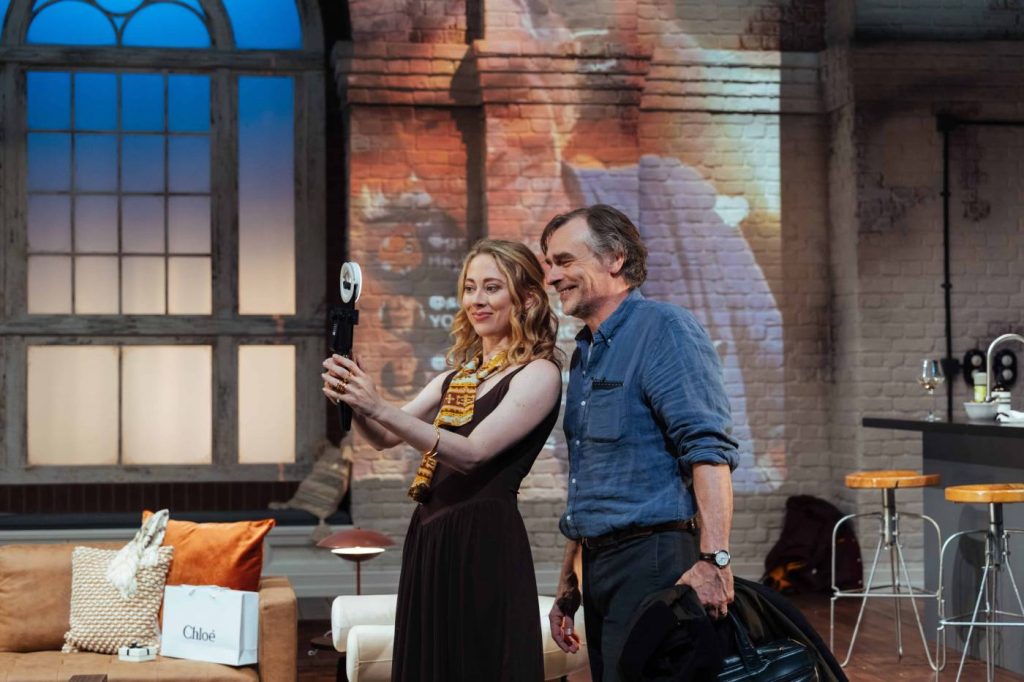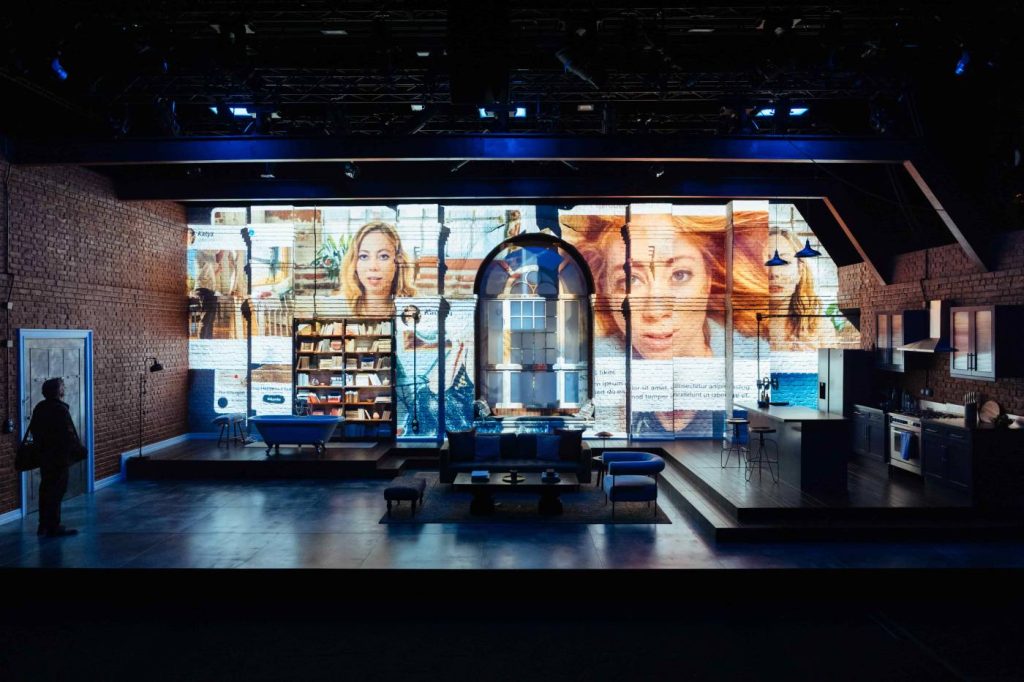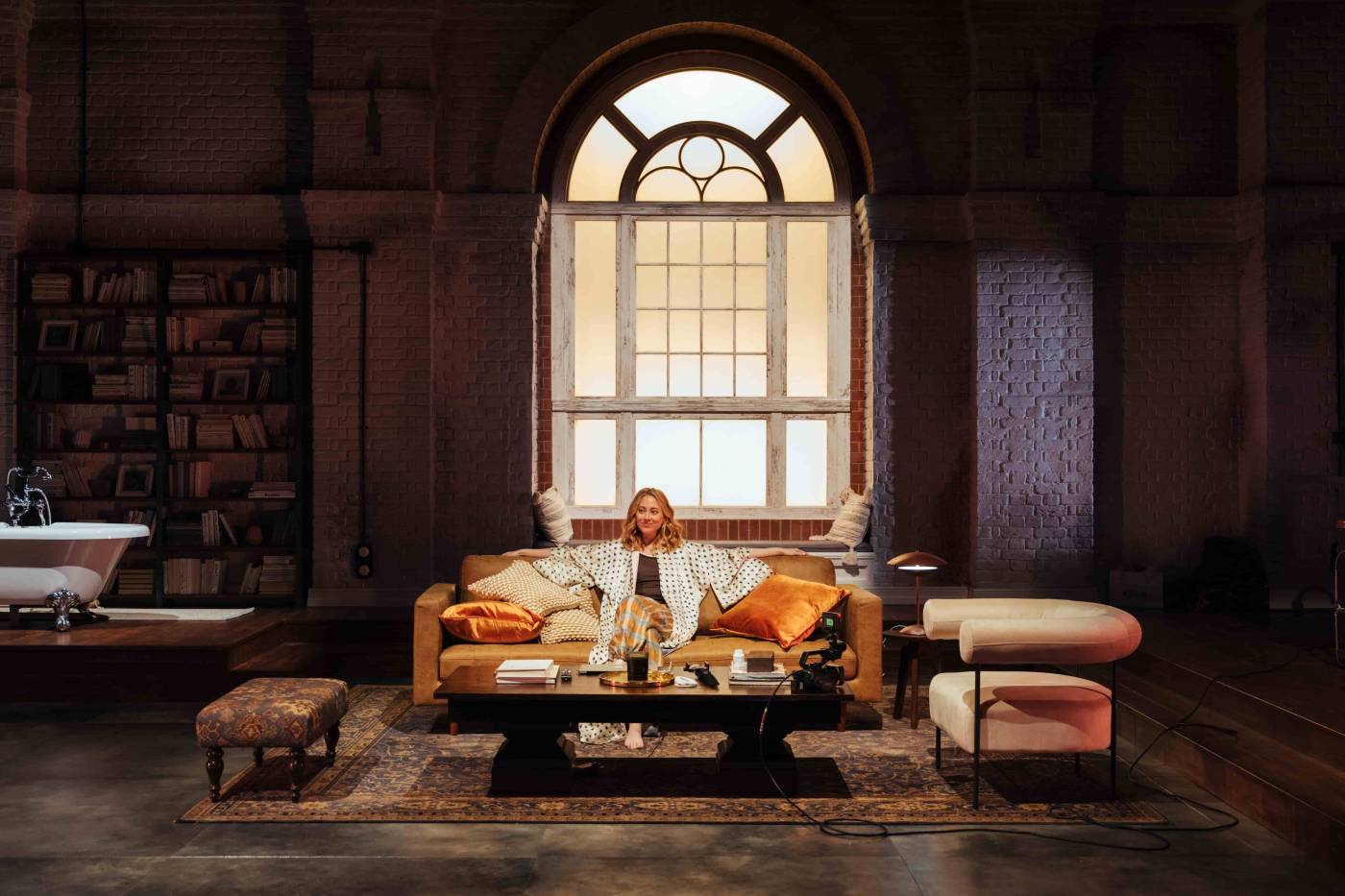Interview at Riverside Studios promises sharp conflict but delivers mixed rewards.
Adapted and directed by Teunkie Van Der Sluijs from Theo van Gogh’s original film, this two-hander pits Robert Sean Leonard’s Pierre, a jaded political journalist, against Paten Hughes’s Katya, an actor-influencer living in a fashionable Brooklyn loft. What begins as a perfunctory profile spirals into a battle over truth, image, and control. Van Der Sluijs updates the material for the digital age: Katya commands social media followers rather than Hollywood tabloids, and screens pulse with live comments and viral statistics.
The story unfolds across a single evening. Pierre arrives late, still agitated by the vice-presidential scandal erupting in Washington. He treats Katya with open disdain, dismissing her influencer career as shallow and unworthy of serious attention. She bristles but plays along, luring him into underestimating her. In the first stretch of the play she parries his questions about her online persona, turning them into opportunities to highlight his cynicism. By the midpoint, she seizes control of the interview by live-streaming their conversation. The balance tilts further when private admissions emerge, forcing each to decide how much of themselves they can reveal without collapse.
The writing is sharp in moments but frustratingly uneven. Banter in the kitchen bristles with wit, only for sincerity to arrive with the abruptness of a stage cue. Van Der Sluijs builds pace through escalating reversals, yet some transitions feel mechanical rather than organic. Pierre’s sudden willingness to confess in the later sections feels under-prepared, while Katya’s emotional leaps can appear more like narrative convenience than character truth. The script knows what subjects it wants to touch, power, gender, media, authenticity, but too often circles them rather than drilling down.

Leonard gives Pierre a convincing weariness. Shoulders hunched, voice weary but edged with contempt, he captures the decay of a once-respected correspondent. Yet when the script demands aggression, he sometimes underplays, softening the sense of danger. Hughes provides the counterweight. Katya moves fluidly from playful to confrontational, toggling between stage-ready charm and flickers of private vulnerability. Her use of the live feed in the second act, chatting brightly to followers while Leonard’s Pierre stews nearby, is a highlight, showing her ability to mask and manipulate simultaneously. However, her volatility sometimes slips into showiness, making the character appear crafted rather than lived. Together they spark in certain passages but miss beats in others, as if the rhythm of rehearsal time never fully settled.
The design is bold. Derek McLane’s loft apartment, all exposed brick and eclectic furnishings, feels homely and performative. The space suggests a life curated for Instagram as much as lived in. Projections by Idontloveyouanymore flood the walls with hashtags, alerts, and breaking news. At best these jolts of visual noise underscore the intrusion of the digital world into private life. At worst they overwhelm the actors, reducing intimacy to background scenery. Sound design adds to the sense of unease, especially in the final quarter when low rumbles press down on confessions. Costume choices reinforce character divides: Pierre’s crumpled suit signals faded authority, while Katya’s wardrobe shifts from casual chic to something closer to armour.

Three moments stay with you. Early on, Katya pulls Pierre into an unexpected kiss, destabilising the power dynamic and daring him to react. At the close of the first half, Pierre rifles through her private files while projected screens reveal what he uncovers, a clever intertwining of action and technology. Near the end, Katya turns off every feed and faces him without mediation, the silence carrying more weight than any earlier outburst. These moments show what the production can achieve when writing, performance, and design align.
Thematically, the play resonates with our present fixation on self-presentation. We live in an age where people measure value in likes, views, and followers, and Interview probes that tension between reach and substance. It asks what happens when someone used to shaping their own narrative collides with someone trained to expose others’. The question is timely, even urgent, but the play answers in fragments rather than conclusions.
This is a show for audiences who enjoy games of shifting power and the thrill of watching characters test each other’s limits. It will also appeal to those curious about how theatre can integrate digital culture without apology. But if you seek a carefully constructed debate on truth, media, and identity, you may feel unsatisfied. Interview throws plenty of sparks, yet only some catch fire.


